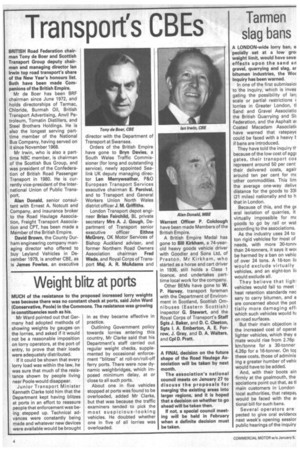Tarmen slag bans
Page 4

If you've noticed an error in this article please click here to report it so we can fix it.
A LONDON-wide lorry ban, e pecially set at a low gro: weight limit, would have seve effects upon the sand an gravel, quarrying and slag, ar bitumen industries, the Woc Inquiry has been warned.
In one of the first submissiol to the inquiry, which is inves gating the possibility of larc scale or partial restrictions lorries in Greater London, ti Sand and Gravel Associatio the British Quarrying and Sli Federation, and the Asphalt at Coated Macadam Associatic have warned that ratepay€ could be faced with a heavy I: if bans are introduced.
They have told the inquiry th because of the low cost of egg' gates, their transport cos represent around 50 per cent their delivered costs, agair around ten per cent for mc other commodities. This lirn the average one-way delive distance for the goods to 331 (21 miles) nationally and to h that in London.
Because of this, and the gE eral isolation of quarries, it virtually impossible for me goods to go by rail or wat according to the associations.
As the industry uses 24 to ton rigid vehicles for most of needs, with more 30-tonni than 24-tonners, it says it woi be harmed by a ban on vehic of over 24 tons. A 16-ton lit would exclude virtually vehicles, and an eight-ton lii would exclude all.
They believe that ligly vehicles would fail to meet • heat retention standards nec sary to carry bitumen, and a are concerned about the pot tially more damaging effi which such vehicles would hi on road surfaces.
But their main objection is the increased cost of operat lighter vehicles, which they e mate would rise from 2.76p km/tonne for a 30-tonner 4.26p for a 16-tonner. On to these costs, those of adminis ing a greater number of vehie would have to be added.
And, with their boots amn firmly at the goalmouth, the sociations point out that, as ti main customers in London local authorities, that ratepay would be faced with the ai tional bill for such bans.
Several operators are pected to give oral evidence next week's opening sessior public hearings of the inquiry










































